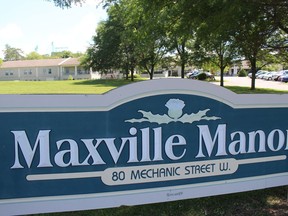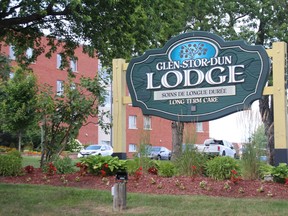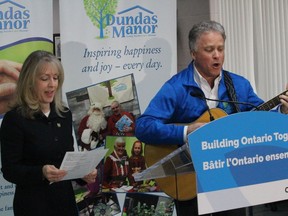
Article content
What are the provincial election candidates’ views on how to grow long-term care in Stormont—Dundas—South Glengarry? Where should new facilities be built, who should run them, and how would they be staffed?
Advertisement 2
Article content
Remi Tremblay, the SDSG Ontario Party candidate, emphasized the need for a hybrid approach to long-term care, one that promotes care at home, when possible.
“More home care in the company of family or caregivers (won’t overwhelm LTC facilities),” Tremblay said. “It would alleviate the current shortage (of space, and) government could release funds to renumerate families and caregivers.”
As for the overall issue of LTC spaces, Tremblay said closer study will better serve the aging than will political promises, that the first step should be having a proper assessment of just how many seniors require care outside their home.
“Secondly it should be assessed what personnel is required for a particular establishment (based on the number of beds),” Tremblay said.

Liberal Party of Ontario candidate Kirsten Gardner also said home care is a top priority.
“We need to make sure that seniors always have the choice of staying in their own homes for as long as possible,” Gardner said. “That’s why our platform includes the home care guarantee. We need to bring back dignity to the aging process and how we care for our most vulnerable. Nobody should be making a profit off our seniors and we will work to end for-profit long-term care.”
Gardner added many health-care workers need to better financially compensated.
“The professionals who care for our seniors (need to be) respected and properly compensated,” Gardner said. “They (also need to) have enough support systems and resources available to make this most important job easier.”
Advertisement 3
Article content

Green Party of Ontario candidate Jacqueline Milner said the party would phase out for-profit LTC and stop licensing new for-profit homes.
“This would be replaced with a non-profit model with a real commitment to give each resident the care they need,” Milner said.
Citing statistics that paint a picture of an aging population and the need to build 55,000 LTC beds over the next decade, Milner said, “I would hope new facilities are built in areas where there is demand. Obviously the first choice for our seniors is likely in the community they have lived and thrived. Also, as ‘quiet’ and ‘green space’ are indicators that support mental health, all new facilities would include a green space which supports the health and well-being of the residents, their family members, and the staff that keep the community home running smoothly.”
She said the Green Party’s vision includes a minimum of one nurse practitioner for every 120 residents and a staff composition that includes 20 per cent registered nurses, 25 per cent registered practical nurses, and 55 per cent personal support workers.
Milner said the party also would mandate a minimum of four hours of nursing and personal care per resident per day (which the current government has already committed to funding in the years ahead), and would fast-track credential approvals for 15,000 international health care workers, including nurses and PSWs.
Claude Tardif, the New Blue candidate, said the location of LTC centres should be selected in consultation with local communities.
Advertisement 4
Article content
“LTC centres require close proximity to hospitals in case of emergencies for their residents, so that is something we need to consider,” Tardif said. “We have two excellent hospitals in Cornwall and Winchester.”
In taking a broader look at the issue, Tardif said LTC growth requires a healthy, robust economy, which his party would accomplish by removing the industrial carbon tax, reducing HST by three per cent, and by shutting down industrial wind turbines. He said the steps will contribute to a five per cent annual growth in Ontario’s economy and also help to provide the required funds to build new LTC centre or add to existing LTC facilities and hire the necessary staff.
Who would run the facilities?
“I support a model that increases the expansion of LTC managed by both non-profit and the municipalities,” Tardif said. “I believe these two models best serve all individuals, offering affordable long-term care without discrimination and supporting the communities with accountability to the local residents.”
He said staffing would include those who were laid off due to COVID-19 mandates, helping address care shortages.
“I would also personally advocate for provincial funding and policies that would attract individuals to pursue a career in health care, including PSWs,” Tardif said.

Ontario NDP candidate Wendy Stephen said Conservative and Liberal governments have built a system in which big, for-profit corporations warehouse seniors in institution-like facilities, that “they cut corners when it comes to staffing and care, in order to pocket bigger profits – and the government lets their CEO and lobbyist friends do it.
Advertisement 5
Article content
“Doug Ford is now handing the very worst homes 30-year licence extensions and more beds so they can make more money. And, he passed a law during the pandemic to protect for-profit long term care corporations from losing lawsuits brought by devastated families.”
She said the NDP would make LTC public and non-profit, that it will phase out for-profit operators within eight years and legislate smaller, family-like municipal and non-profit long-term care homes. She said the NDP platform plank for LTC includes funding 50,000 new long-term care spaces by 2030, and also includes the minimum of four hours hands-on care for every long-term care resident in Ontario.
She said the party would legislate a minimum of 70 per cent full-time workers and wage parity for health care workers in LTC, as well as paid sick days.
“In addition, the NDP has a plan to ensure people can live at home longer as they age, with reliable and expanded services to support their needs,” Stephen said.

Progressive Conservative Party of Ontario candidate Nolan Quinn said investment in LTC facilities is a critical need, but the need for new buildings, and upgrades to existing ones, “is not limited to one specific region within our riding – the need exists in every corner of Stormont—Dundas—South Glengarry. Our seniors need to be able to age in their home communities, many of whom have family roots that span generations. We cannot force them to relocate to new, and often distanced locations from their homes and families.”
Quinn said it should be the experts in the field who make the most important calls.
“I believe that the health- and home-care experts are better positioned to lay out a plan of how these facilities should be run, as opposed to elected politicians who are often removed from the reality of the current state of the system,” Quinn said.
thambleton@postmedia.com
This news is republished from another source. You can check the original article here

Be the first to comment